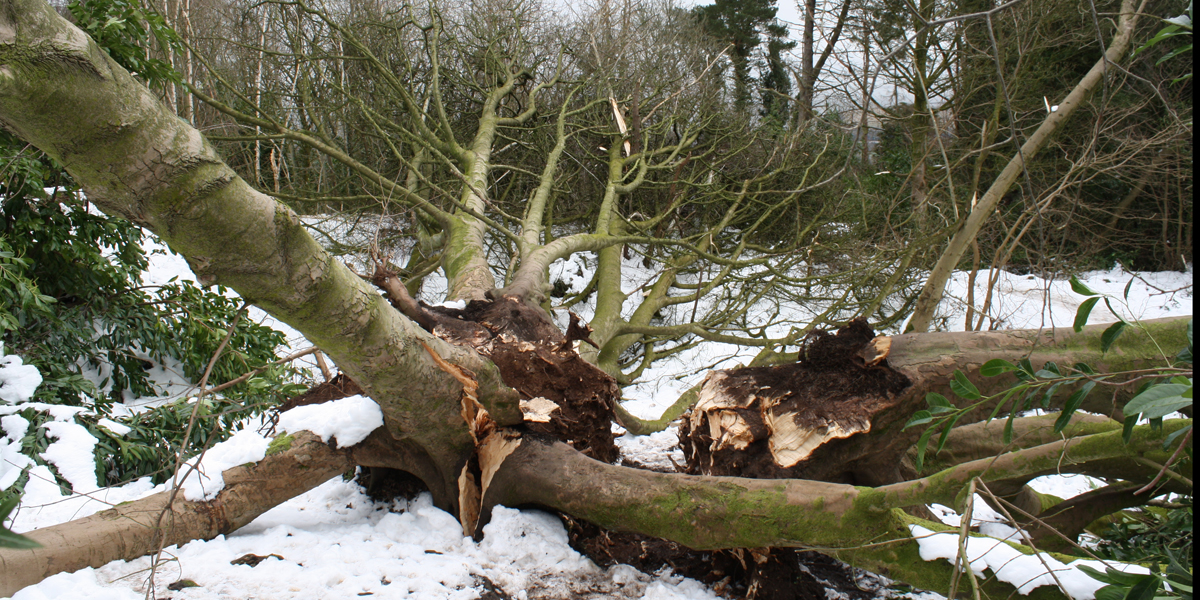Forests go through months and years of cruel winters unscathed, but then in a few hours nature deals them a knock-out blow.
The snow storm of three weeks ago did more damage than Dúlra has ever seen. This photo is of an ancient lime tree on Cave Hill – one of the biggest in the forest – split down the middle like a melon. It’s as if it was shattered by a bolt of lightening; but no, it was destroyed by one of the most delicate, most beautiful things nature has ever invented: snow.
And in Colin Glen this week, it seemed that as many trees were down as were growing. Deciduous trees should be well placed to withstand wind, their thin branches providing little resistance. But that ever-present parasite, the evergreen ivy, was the real killer. Snow was able to gather on it, weighing down trees until they just had to give way. In many cases falling trees had a domino effect and road-width paths were cut across the forests.
Dúlra’s still got sore thighs from negotiating all the paths in the upper glen which were blocked with tree trunks. It’s bad news for families – you may forget about visiting until all the repair work is done. But it’s great for nature buffs because while Dúlra was on the outskirts of West Belfast, it felt like he was discovering a new jungle in Borneo.
Strangely, rabbits were here in numbers. Rabbits normally don’t do forests, for the very simple reason there’s not much grass there. But this week they slunk in the undergrowth, fearful eyes watching as Dúlra passed. They knew they had nowhere to run to.
They were big, full-grown animals, but painfully thin. They had been forced from the surrounding fields by the snow and couldn’t make it back to their burrows. They probably hadn’t had a grassy meal in weeks. The only evergreen plant on the forest floor is wild garlic – but rabbits mustn’t like garlic much, or the animals Dúlra came across would have looked much happier.
Dúlra was glad he hadn’t a dog with him – the poor rabbits would have been picked up effortlessly.
Treecreepers, goldcrests and flocks of tits were busy looking for nest-sites, but Dúlra had eyes on only one bird – the dipper. Snow might be on the ground, but the dipper will already be incubating eggs in its domed nest.
It’s not hard to find a dipper in Colin Glen, you just have to walk the river bed, stumbling from rock to rock. Which is just as well really because all the wee wooden bridges have been destroyed.
When Dúlra was young, all the paths and bridges were kept intact by the National Trust. Not so now.
The river was roaring, its volume increased fivefold by immense amounts of snowmelt pouring down from above, but still the dipper went about its river business. It was on a fallen log a hundred yards ahead beside the first waterfall. Its lovely Irish name, gabha dubh, means blacksmith, very fitting for it bobs endlessly up and down, like a hammer on an anvil.
Dúlra cut back and circled to a vantage point high on the riverbank where he could lie down and focus the binoculars on the bird. It was most likely the male; the female would be incubating. The bird wasn’t interested in feeding. It just sat there in front of the waterfall, occasionally moving a foot or so to one side of the ivy-covered log and back again. It was clearly on-guard beside the nest. Dúlra was sure it hadn’t seen him climb the bank; if he could only stay still long enough, maybe it would visit the nest to feed its mate. It was a case of who would blink first...
Although the bank seemed covered with fallen leaves, there was a layer of melting snow underneath. After an hour the freeze began to seep into Dúlra’s bones. He just had to move to get circulation going. And as soon as he did, the dipper took off and disappeared around the bend.
When the thaw came at last, Dúlra wasn’t just happy for the lambs, but for the rabbits of Colin Glen. And the one advantage that the wily dipper had over Dúlra – snow on the banks – is now gone.
Game on.






